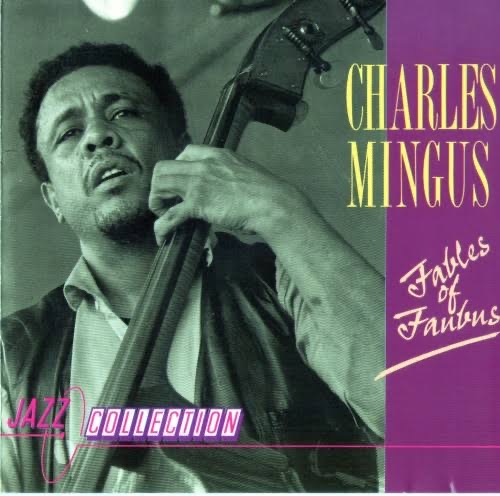Difference between revisions of "Fables of Faubus (1959)"
| Line 18: | Line 18: | ||
== Recording and Reception == | == Recording and Reception == | ||
| + | The song was first recorded for Mingus' 1959 album, Mingus Ah Um. However, Columbia Records refused to allow the lyrics to the song to be included, and so the song was recorded as an instrumental on the album. It was not until October 20, 1960 that the song was recorded with lyrics, for the album Charles Mingus Presents Charles Mingus, which was released on the more independent Candid label. <ref>Ingrid Monson,. Freedom Sounds: Civil Rights Call Out to Jazz and Africa. 2007z ''Oxford Oxfordshire: Oxford University Press'' p. 183. ISBN 978-0-19-512825-3. Retrieved from [https://en.m.wikipedia.org/wiki/Fables_of_Faubus#CITEREFMonson2007 Wikipedia], February 1, 2021.</ref> Due to contractual issues with Columbia, the song could not be released as "Fables of Faubus", and so the Candid version was titled "Original Faubus Fables". <ref>Ingrid Monson,. Freedom Sounds: Civil Rights Call Out to Jazz and Africa. 2007z ''Oxford Oxfordshire: Oxford University Press'' p. 264. ISBN 978-0-19-512825-3. Retrieved from [https://en.m.wikipedia.org/wiki/Fables_of_Faubus#CITEREFMonson2007 Wikipedia], February 1, 2021.</ref> | ||
| + | |||
| + | Critic Don Heckman commented of the unedited "Original Faubus Fables" in a 1962 review that it was "a classic Negro put-down in which satire becomes a deadly rapier-thrust. Faubus emerges in a glare of ridicule as a mock villain whom no-one really takes seriously. This kind of commentary, brimful of feeling, bitingly direct and harshly satiric, appears far too rarely in jazz."<ref>Gene Santoro. Myself When I Am Real. 2001. ''Oxford: Oxford Univ. Press''. ISBN 978-0-19-514711-7. Retrieved from [https://en.m.wikipedia.org/wiki/Fables_of_Faubus#CITEREFMonson2007 Wikipedia], February 1, 2021.</ref> | ||
== Covers == | == Covers == | ||
Revision as of 04:09, 2 February 2021
Fables of Faubus is a composition written by jazz double bassist and composer Charles Mingus. One of Mingus's most explicitly political works, the song was written as a direct protest against Arkansas governor Orval Faubus, who in 1957 sent out the National Guard to prevent the racial integration of Little Rock Central High School by nine African American teenagers, in what became known as the Little Rock Crisis.[1]
Key Lyrics
Name me someone who's ridiculous, Dannie.
Governor Faubus!
Why is he so sick and ridiculous?
He won't permit integrated schools.
Name me a handful that's ridiculous, Dannie Richmond.
Faubus, Rockefeller, Eisenhower.
Why are they so sick and ridiculous?
Recording and Reception
The song was first recorded for Mingus' 1959 album, Mingus Ah Um. However, Columbia Records refused to allow the lyrics to the song to be included, and so the song was recorded as an instrumental on the album. It was not until October 20, 1960 that the song was recorded with lyrics, for the album Charles Mingus Presents Charles Mingus, which was released on the more independent Candid label. [2] Due to contractual issues with Columbia, the song could not be released as "Fables of Faubus", and so the Candid version was titled "Original Faubus Fables". [3]
Critic Don Heckman commented of the unedited "Original Faubus Fables" in a 1962 review that it was "a classic Negro put-down in which satire becomes a deadly rapier-thrust. Faubus emerges in a glare of ridicule as a mock villain whom no-one really takes seriously. This kind of commentary, brimful of feeling, bitingly direct and harshly satiric, appears far too rarely in jazz."[4]
Covers
Reception
- ↑ Charles Hersch. Democratic Artworks: Politics and the Arts from Trilling to Dylan. Albany: State University of New York Press. ISBN 978-0-7914-3801-5. Retrieved from Wikipedia, February 1, 2021.
- ↑ Ingrid Monson,. Freedom Sounds: Civil Rights Call Out to Jazz and Africa. 2007z Oxford Oxfordshire: Oxford University Press p. 183. ISBN 978-0-19-512825-3. Retrieved from Wikipedia, February 1, 2021.
- ↑ Ingrid Monson,. Freedom Sounds: Civil Rights Call Out to Jazz and Africa. 2007z Oxford Oxfordshire: Oxford University Press p. 264. ISBN 978-0-19-512825-3. Retrieved from Wikipedia, February 1, 2021.
- ↑ Gene Santoro. Myself When I Am Real. 2001. Oxford: Oxford Univ. Press. ISBN 978-0-19-514711-7. Retrieved from Wikipedia, February 1, 2021.
